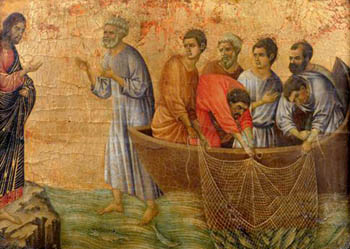Q. In your blog post “How can an evil being like Satan be allowed in God’s holy presence, in the book of Job?” does the text next to Job’s wife’s head in the medieval illustration actually say, “Curse God and die”? I can’t quite make it out. What language would that be?

The text in the illustration, reproduced above, is in Latin. It says, employing some spelling abbreviations that were common in medieval manuscripts, benedic Deo et morere, that is, “Bless God and die.”
This is actually a literal translation of the original Hebrew. Why, then, do almost all English translations read instead, “Curse God and die”? Only Young’s Literal Translation and the 1899 American edition of the Douay-Rheims have “bless.”
The problem is not limited to this one place in Job. There are several other places in the book where almost all English translations read “curse,” but these two most literal translations have “bless,” reflecting the Hebrew original. Specifically:
“He would sacrifice a burnt offering for each of them, thinking, ‘Perhaps my children have sinned and cursed God in their hearts.’”
“Stretch out your hand and strike everything he has, and he will surely curse you to your face.”
“Stretch out your hand and strike his flesh and bones, and he will surely curse you to your face.”
This is an interesting issue for textual criticism, that is, for the discipline of figuring out what the text of the Bible originally said, because we don’t have any manuscripts that actually read “curse” in these places. Ordinarily this lack of “external evidence” would rule out an alternative reading like this. But “bless” simply doesn’t make sense in these contexts, and so the word is almost certainly a euphemism for “curse.” That is, the scribes who were copying the book of Job simply didn’t want to write “curse God,” even if that was what the Bible said there, and so they wrote “bless God” instead. Most textual critics and Bible translators agree that this is what’s going on; a footnote in the English Standard Version (ESV), for example, explains at the first of these occurrences that “the Hebrew word bless is used euphemistically for curse” in all these places in the book of Job.
Another passage in the Bible helps us confirm that this understanding is correct. At one point in the long story of Israel’s monarchy, King Ahab wants to obtain a vineyard belonging to a man named Naboth so he can add the land to his palace grounds as a garden. When Naboth won’t sell because he honors the property inheritance principle in the Law of Moses (“The Lord forbid that I should give you the inheritance of my ancestors”), Queen Jezebel plots to have him unjustly convicted of a capital offense and executed. She orders the elders of Naboth’s city to “bring charges that he has cursed both God and the king.” The account then relates that two “scoundrels” were found (two witnesses were required to convict someone of a crime) to make the accusation, “Naboth has cursed both God and the king.” He was executed, and Ahab took his land.
In both cases, the reading in Hebrew is “blessed.” But that would make even less sense here—why would anyone be tried and executed for blessing God and the king? So it must have originally said “cursed.” (Interestingly, even the American Douay-Rheims has an alternative reading here, “blasphemed,” though Young’s, faithful to its strictly literal principles, has “blessed.”)
Your question about the illustration in my other post, however, reveals that the Vulgate, the Latin Bible that the Western church used for around a thousand years, reads “bless God” in these various passages in the book of Job. (It also reads “blessed” in the Naboth episode.) That’s why this expression appears in such illustrations.
And in the interests of justice, I would also like to specify that while Naboth was unfortunately executed as a result of Jezebel’s plot, the prophet Elijah met King Ahab when we went to inspect “his” new property and told him, “I will surely make you pay for [your crime] on this plot of ground, declares the Lord.” Ahab was later assassinated near his palace and his body was dumped on the land that was formerly Naboth’s vineyard.



